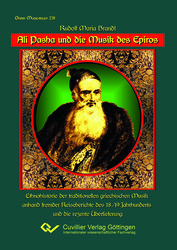| Fachbereiche | |
|---|---|
| Buchreihen (97) |
1381
|
| Nachhaltigkeit |
3
|
| Gesundheitswesen |
1
|
| Geisteswissenschaften |
2369
|
| Medienwissenschaften | 16 |
| Theologie | 57 |
| Philosophie | 102 |
| Rechtswissenschaft | 423 |
| Wirtschaftswissenschaften | 851 |
| Sozialwissenschaften | 417 |
| Sportwissenschaften | 48 |
| Psychologie | 233 |
| Pädagogik | 190 |
| Geschichtswissenschaften | 183 |
| Kunstwissenschaften | 111 |
| Kulturwissenschaften | 166 |
| Literaturwissenschaften | 117 |
| Sprachwissenschaften | 88 |
| Naturwissenschaften |
5408
|
| Ingenieurwissenschaften |
1795
|
| Allgemein |
98
|
|
Leitlinien Unfallchirurgie
5. Auflage bestellen |
|
Erweiterte Suche
Ali Pasha und die Musik des Epiros (Band 231)
Ethnohistorie der traditionellen griechischen Musik anhand fremder Reiseberichte des 18./19.Jahrhunderts und die rezente Überlieferung
Rudolf M. Brandl (Autor)Vorschau
Leseprobe, PDF (510 KB)
Inhaltsverzeichnis, PDF (170 KB)
The Albanian Vezir Ali Pasha Tepeleni was a famous Pasha and warlord between 1798-1821 of the Ottoman Empire, whose cultural activities influenced the traditional Greek and Albanian music of mainland Greeece till today. Many foreign travellers visited his court in Janina/Ioannina, capital of Epiros (Northern Greece), where a synthesis of South- European and Fanariot urban music mixed with Greek, Aromun (Vlach) and South- Albanian folk music was performed by Jewish and Roma musicians. This urban music has a genuin Greek „kommati”-structure of fractal dimensions (similary with the „skopos” structure of the Greek Islands), which is verified by comparative analyses, recorded during a long term ethnomusicological fieldresearch since 1977 by Rudolf and Daniela Brandl and Bernhard Graf and archived in the „R.M. Brandl Collection” in the Phonogrammarchiv of the Austrian Academy of Sciences in Vienna and published in the „Orbis Musicarum” series in the Cuvillier Verlag on DVD. An important source is the Heritage Manuscript of the Epirotic master musician in the 5 th generation, Grigoris Kapsalis. It was recorded according to emic aesthetics and contained 60 Kleftic ballads, Ioanniotika and Alipashalitika from only one professional musicians family repertoire.
| ISBN-13 (Printausgabe) | 9783736994843 |
| ISBN-13 (E-Book) | 9783736984844 |
| Buchendformat | B5 |
| Sprache | Deutsch |
| Seitenanzahl | 572 |
| Umschlagkaschierung | glänzend |
| Auflage | 1. + 2 DVD's |
| Buchreihe | Orbis Musicarum |
| Band | 231 |
| Erscheinungsort | Göttingen |
| Erscheinungsdatum | 24.02.2017 |
| Allgemeine Einordnung | Sachbuch |
| Fachbereiche |
Soziologie
Geschichte der Neuzeit Orts- und Landesgeschichte, Regionalgeschichte Musikwissenschaft Slavistik und Byzantistik (einschließlich Neugriechisch) Ethnologie |
| Schlagwörter | Ali Pasha Tepelini, traditional Greek and Albanian music, janina/Ioannina, synthesis of South-European and Fanariot urban music, folk music, Jewish musicians, Roma musicians, skopos, ethnomusicological fieldresearch, R.M. Brandl Collection, Orbis Musicarum, Epirotic master musician, Grigoris Kapsalis, emic aesthetics, kleftic ballads, Ioanniotika, Alipashalitika, Volksmusik Griechenland, Epiros, Koumpaneia, Klarinettenensemble, Räuberballaden, Ali Pasha, Ioannina |








